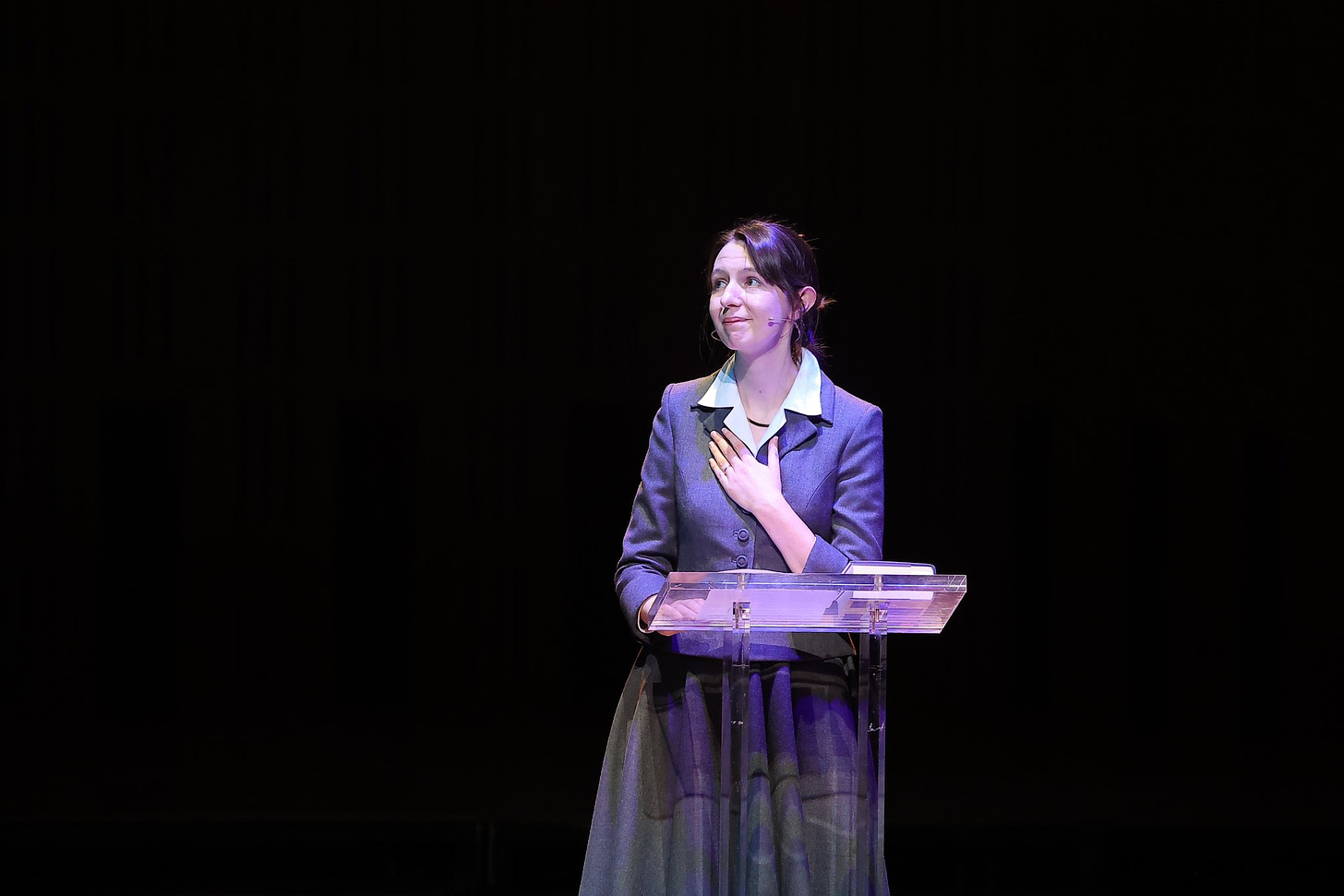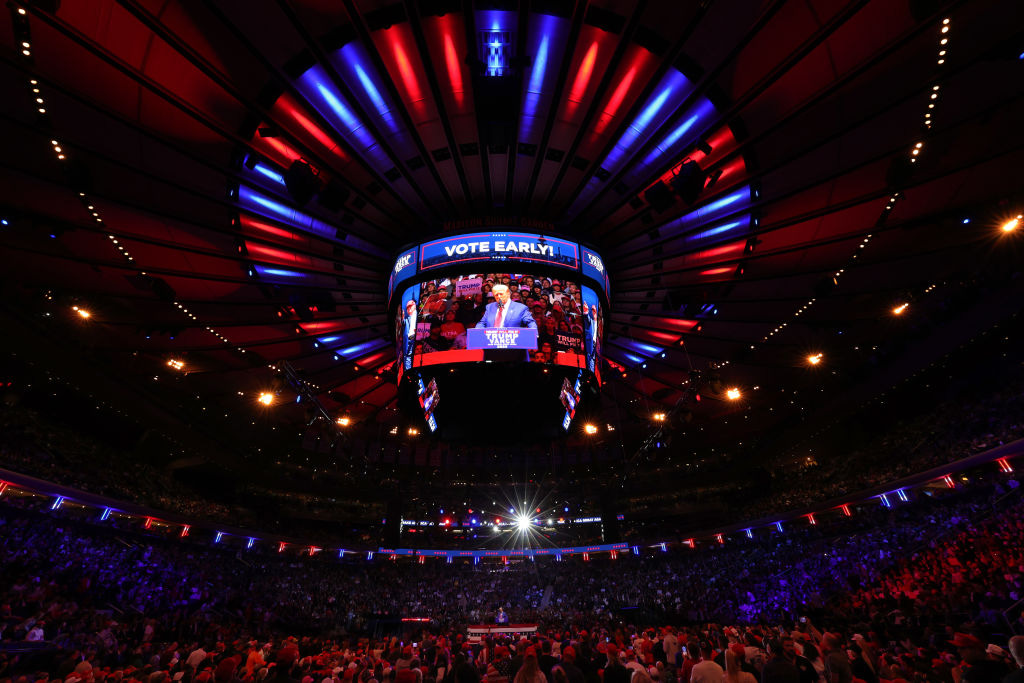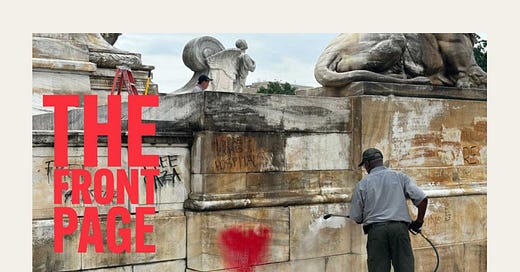
It’s Monday, October 28, and this is The Front Page, your daily window into the world of The Free Press—and our take on the world at large. Coming up: Lionel Shriver on the latest anti-Israel mob—this one led by literary darling Sally Rooney. Martin Gurri on Cuba’s crumbling regime. Jay Solomon reports on the curious case of Ariane Tabatabai at the Pentagon. And much more.
But first: a jittery Harris campaign and Ruy Teixeira on how the political climate has changed.
As we enter the home stretch of the race for the White House, Kamala Harris’s campaign isn’t exactly exuding confidence.
Take one of her team’s current headaches: how to keep Joe Biden away from the campaign trail. Axios reports that Harris HQ “believes Biden is a political liability at a crucial time in the campaign—but is reluctant to directly say they don’t want him to campaign for her.”
Or consider the campaign’s closing pitch. Harris has resorted to an almost entirely negative message to voters, focused on the evils of Donald Trump rather than her own vision. Last week, Harris ratcheted up the rhetoric by dropping the f-bomb, calling Trump a “fascist” during a CNN town hall.
Yesterday, her running mate Tim Walz suggested that Donald Trump’s choice of venue for a rally this weekend—Madison Square Garden—was a deliberate nod to a rally held at the same venue by American Nazis in 1939. “There’s a direct parallel to a big rally that happened in the mid-1930s at Madison Square Garden, and don’t think that he doesn’t know for one second exactly what they’re doing there,” said Walz at a campaign stop in Nevada on Sunday.
Why the Democrats reach for overblown Nazi comparisons is mind-boggling to me. First, because the reality is bad enough! As Alex Thompson points out in his report from yesterday’s rally, Trump’s opening speakers said that Harris “and her pimp handlers will destroy our country.” Hillary Clinton was called “a sick son of a bitch.” And the vice president is “the anti-Christ.”
Second: It’s not a winning strategy. That’s not just my hunch—it’s the worry of the folks at Future Forward, the leading super PAC supporting Harris’s bid. A memo circulated to Democrats outlining what messages their internal testing showed to be most effective warned, “Attacking Trump’s Fascism Is Not That Persuasive.” It urged Democrats to focus on “positive details about Kamala Harris’s plans to address the needs of everyday Americans.” (Andrew Sullivan makes a similar point in his latest.)
Why is the Harris campaign so defensive, so negative, and so jittery? Part of the answer is the simple fact that they are locked in a coin toss against someone many Democrats really believe represents an existential threat to American democracy.
Another part of the answer, though, is the sense that on big issues like immigration, the economy, identity, and foreign affairs, the country is not with the Democrats. That’s what today’s lead story, by Ruy Teixeira, is all about.
Ruy is the co-author of the seminal 2002 book The Emerging Democratic Majority, the co-founder of The Liberal Patriot, and a fellow at the American Enterprise Institute. Most pertinent to this essay, he’s a liberal worried about the dangers of left-wing overreach.
Today, he sounds the death knell for the progressive moment that crested in 2020 and 2021 with the BLM protests and the heady early days of the Biden administration. That moment has very obviously passed—just look at Harris’s attempt to disown all the policies she backed last time she ran for president. But what killed the progressive moment? Ruy has some ideas.
Read Ruy Teixeira on “How Progressives Blew It.”

Lionel Shriver: Sally Rooney’s Literary Mob
Last week, some 400 writers, including A-listers like Sally Rooney and Arundhati Roy, signed a letter calling for a boycott of the Israeli publishing industry, excepting those who have denounced the “genocide” in Gaza. Novelist and critic Lionel Shriver says: Count me out. Read the always sharp-tongued Lionel Shriver: “Sally Rooney’s Literary Mob.”
Martin Gurri: Cuba Enters a Dark Age
Cuba has endured days-long blackouts in recent weeks, only the latest sign of the woeful conditions endured by Cubans under Communist rule. Martin Gurri writes of the island that he and his parents fled: “Cuba itself is hardly a country; it’s a lifeless thing, a corpse bleeding out its best talent, inert and decaying amid the glorious beauty of the Caribbean.” But will anything change? After all, Cuba’s dire situation has endured for decades. “Yet we are taught by religion to believe in resurrection,” writes Martin. “The island-wide blackout, inconceivable in a modern nation, provides an omen for the future. Sooner or later, infrastructure collapse will trigger political collapse.” Read Martin Gurri’s essay on Cuba’s darkness.
Jay Solomon: The Curious Case of Ariane Tabatabai
Why was senior Pentagon official Ariane Tabatabai moved from a job in which she has access to some of the most closely guarded secrets in government, to one where she “can’t really touch any classified material”? In recent weeks, Tabatabai’s name has been floated as the possible leaker of highly sensitive documents relating to Israel’s plans for an attack on Iran. There’s no publicly available evidence that Tabatabai is the leaker, and Defense Secretary Lloyd Austin has all but ruled out the possibility. But Tabatabai was already under scrutiny for her role in an Iranian influence operation. So it’s no wonder her job change is raising eyebrows. Jay Solomon has the story.
Francesca Block: Magazine That Rejected “Israel” Ad Promoted “Antisemitic” Book
Last week, Francesca Block reported that a publishing trade magazine refused to run an ad for Bernard-Henri Lévy’s new book Israel Alone because “customers might complain.” Since we ran her first report, Francesca has learned that the same publication, Shelf Awareness, had no qualms about running an advertisement for P Is for Palestine, a children’s book accused of promoting an “antisemitic” ideology. On Friday, Shelf Awareness apologized for rejecting the ad for Lévy’s book. Read Francesca Block’s latest report on the controversy here.

With eight days to go until Election Day, Nate Silver’s model puts Donald Trump’s chances of victory at 53 percent to Kamala Harris’s 47 percent. (For the hardcore election nerds, Nate has just published a deep dive on the state of the race in seven battleground states.) PowerPoint king Bruce Mehlman says the race will come down to five questions: 1. Who is the “change candidate”? 2. Who is more trusted on the economy? 3. Will abortion or immigration voters surge? 4. Who will execute better? 5. Is the polling wrong again?
Meanwhile, how are officials preparing for this joyous festival of democracy? By fortifying election offices. At the Bureau of Elections in Luzerne County, Pennsylvania, that means installing bulletproof glass and surrounding the building with boulders to protect it from car bombs.
The Washington Post newsroom is in uproar over the paper’s decision not to endorse a presidential candidate. Publisher Will Lewis announced the decision with a Friday column. One opinion editor quit over the move. A cartoonist drew an extremely earnest protest cartoon about “darkness,” columnists are now writing columns attacking their own boss (just the kind of navel-gazing you want a week out from the election), and thousands of readers have canceled their subscriptions. It’s a shame; I was really curious who the paper would back this time around, which is so hard to tell from the rest of their coverage. (One other amusing detail: Apparently confused readers have been emailing The New York Times and writing words to the effect of “Fuck Bezos” before asking to cancel their subscriptions.)
“The attack on Iran was precise and powerful and attained all of its goals,” said Israeli prime minister Benjamin Netanyahu on Sunday. Israel’s strike on Iran early Saturday morning reportedly hit Tehran’s most advanced aerial defense systems—and it demonstrated the gap between the two nations’ defense capabilities. ICYMI: Read Niall Ferguson’s latest Free Press essay, on “Israel’s Iran Strike—and America’s Strategic Weakness.”
How do Americans feel about the state of their democracy? Not great. Just 49 percent say they feel American democracy does a good job of representing the people; 45 percent say it does not do a good job. And three in four say American democracy is under threat.
Whenever I get worried about the state of the world, I remind myself that the kids are the future. And then I get really depressed. The latest evidence that that gloom is well-placed comes via Jean Twenge, who reports in The Atlantic that just 27 percent of American high school seniors agree with the statement that “Despite its many faults, our system of doing things is still the best in the world.”
Hezbollah’s Hostages: The Lebanese Women Who Took to the Streets
Five years ago they rose up to save their country, only to be crushed by the terrorist group. Now, they’re calling on the world to hear their plea.
Hezbollah’s Hostages, our weekly animated series featuring brave opponents speaking out against the terror group, has featured a former sex slave, an ex–drug mule, a radical turned peace activist, and others. This week, it spotlights two Lebanese women who risked their lives to demand a different future for their country. They describe the hope that drove their protests and explain why they raised their voices and waved their nation’s flag in an atmosphere of heady idealism, as civilians across every ethnicity and sect gathered to demand reform. Watch below:
For more information on this episode, click here. And to catch up on the rest of the series, produced by the Center for Peace Communications, click here.
Oliver Wiseman is a writer and editor for The Free Press. Follow him on X @ollywiseman.
To support The Free Press, become a paid subscriber today:
And for a new way to help The Free Press, and help yourself, check out our new referral program.








I know this is a terrible thing to say, and a bad argument, but I'll say it anyway.
(Woman here) - Part of the reason I don't want Harris to win is because I don't want her to be the first woman President. I know that no ones perfect, and it's insane that we haven't had a female President yet, but it's just... I envision the first woman President, the first female leader of the free world, as being absolutely incredible. In my mind, she's powerful, and opinionated, and charismatic, and qualified, and she shatters the glass ceiling effortlessly, and she's this woman that girls everywhere will look up to.
And Harris isn't that. She's an empty suit, who speaks her Democratic talking points, who is half hiding behind the legacies of Obama and Biden, men. For some, she's the lesser evil, but barely anyone is excited for her to win.
It's just too anticlimactic for her to be the first female leader of the free world.
(I'd vote Nellie or Bari in, btw. TGIF for the whole nation every Friday!)
Hi Oliver I got a hot tip you might want to follow up on: There's this guy who commentates MMA fights and is a comedian and he has a podcast. I stumbled upon it Friday and he was interviewing Donald Trump! Crazy, right? It was long but good and interesting. Can one of the interns track it down and maybe you mention it? I think it might be important and you could scoop the other mainstream media who aren't covering it either. Thanks!